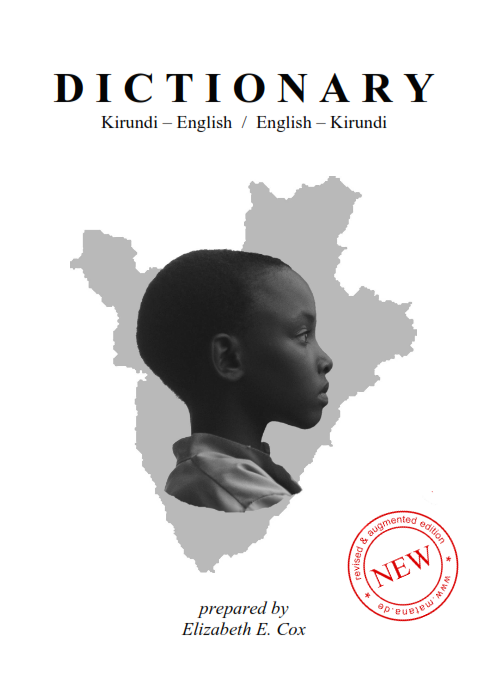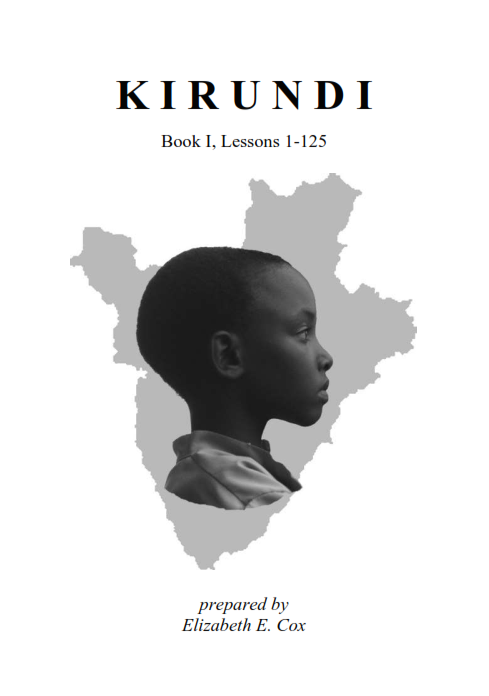buy ▶ (to) kugura, kununūra
(to ~ and sell) kudāndaza, guhānjura
(to ~ a thing together and then divide it) gusorōra
(look things over in prospect of buying) kugaragura
(to ~ very much) kurangura
(to ~ and sell) kudāndaza, guhānjura
(to ~ a thing together and then divide it) gusorōra
(look things over in prospect of buying) kugaragura
(to ~ very much) kurangura
En-En dictionary
inombe 3 class 3
singular: i-,in-
plural: i-,in- ▶ (no pl.) soil with much clay in it
singular: i-,in-
plural: i-,in- ▶ (no pl.) soil with much clay in it
urunombe 6 class 6
singular: uru- ▶ (no pl.) soil with much clay in it
singular: uru- ▶ (no pl.) soil with much clay in it
kuramagiza (-ramagije) v ▶ to give too much to swallow at a time
gusinzikara (-sinzikaye) v ▶ to suffer much
kurēngerana (-rēngeranye) v ▶ 1. to be overripe (bananas), 2. to have too much to do
do ▶ (to) kugira, gukora
(again) kwongera
(always) kwāma, guhora
(anyhow, in spite of) gupfa
(continually) kwāma, guhora
(the dishes) kwoza ivyombo
(even more) kurushiriza
(first) kubānza, gushūza
(forcefully) kwīhanukīra
(habitually) kumēnyera
(have too much to ~) kurēngerana
(the impossible) gufyidikīra
(~-it-yourself) ukugira utugenegene
(housework) kugora
(one's duty) gushimika
(quickly) gukwākwānya, gushōka, gusobaganya, gusūriranya, gutebūtsa
(quickly and carelessly) kuraha
(quickly without thinking) gusimbagurika
(~ not) -ōye (verb without infinitive)
(reluctantly) kwīyumānganya
(a sloppy job) kurēngagiza
(something alone) kwīgūnga
(something by oneself without authority) kwigenera
(something that causes pleasure or amazement) gusamāza
(that which you declared you would not ~) kwīrahuruza
(two things at once) kubāngikanya
(unwillingly) kugoyagoya
(unwillingly and complainingly) kunyinkira
(the washing up) kwoza ivyombo
(again) kwongera
(always) kwāma, guhora
(anyhow, in spite of) gupfa
(continually) kwāma, guhora
(the dishes) kwoza ivyombo
(even more) kurushiriza
(first) kubānza, gushūza
(forcefully) kwīhanukīra
(habitually) kumēnyera
(have too much to ~) kurēngerana
(the impossible) gufyidikīra
(~-it-yourself) ukugira utugenegene
(housework) kugora
(one's duty) gushimika
(quickly) gukwākwānya, gushōka, gusobaganya, gusūriranya, gutebūtsa
(quickly and carelessly) kuraha
(quickly without thinking) gusimbagurika
(~ not) -ōye (verb without infinitive)
(reluctantly) kwīyumānganya
(a sloppy job) kurēngagiza
(something alone) kwīgūnga
(something by oneself without authority) kwigenera
(something that causes pleasure or amazement) gusamāza
(that which you declared you would not ~) kwīrahuruza
(two things at once) kubāngikanya
(unwillingly) kugoyagoya
(unwillingly and complainingly) kunyinkira
(the washing up) kwoza ivyombo
En-En dictionary
soil ▶ ivu, agataka
(with much clay in it) inōmbe
(to soften up) kwōrohereza
(to be worn out) gutītūka
(with much clay in it) inōmbe
(to soften up) kwōrohereza
(to be worn out) gutītūka
En-En dictionary
swallow ▶ kumira, gutamira
(gluttonously) kumiragura
(to give too much to ~ at one time) kuramagiza
(gluttonously) kumiragura
(to give too much to ~ at one time) kuramagiza
En-En dictionary
rwōse adv ▶ 1. absolutely, 2. completely, entirely, 3. very much (from -ōse)
-īnshi adj ▶ 1. many, 2. much, 3. several
kenshi often
kenshi often
cane adv ▶ 1. much, 2. very, rather, 3. exceedingly, 4. really, 5. too, 6. a lot
cane cane phr ▶ 1. very much, 2. especially, 3. enormously
nangāhe adj ▶ how much?
have ▶ –fise, kugira, gutūnga
(absolutely all one wants, and to be a bit showy about it) kunyananyaya
(abundance) kudibama, guhīmba
(always) guhorana
(bad habits, having had good) gufūtāna
(diarrhea) gucībwamwo, guhitwa, kudodomwa, kwīruka, gushuruza
(done recently) guherūka
(fellowship) gufatanya
(fellowship with) gucudika
(fever) kurwara inyonko
(for) –fitiye
(friendhsip with) gucudika
(holes from rust) kunyengetērwa
(much, may be even lots of debts or trouble) kuroranirwa
(pain) kubabara
(sex) kuryamana, kwenda, kurongorana, kurya umwana
(sloping sides, like soup dish) gufukūra
(speech impediment) kugobwa
(things in common) kubūngirana
(to ~ to) kurīnda, –kwīye
(absolutely all one wants, and to be a bit showy about it) kunyananyaya
(abundance) kudibama, guhīmba
(always) guhorana
(bad habits, having had good) gufūtāna
(diarrhea) gucībwamwo, guhitwa, kudodomwa, kwīruka, gushuruza
(done recently) guherūka
(fellowship) gufatanya
(fellowship with) gucudika
(fever) kurwara inyonko
(for) –fitiye
(friendhsip with) gucudika
(holes from rust) kunyengetērwa
(much, may be even lots of debts or trouble) kuroranirwa
(pain) kubabara
(sex) kuryamana, kwenda, kurongorana, kurya umwana
(sloping sides, like soup dish) gufukūra
(speech impediment) kugobwa
(things in common) kubūngirana
(to ~ to) kurīnda, –kwīye
En-En dictionary
suffer ▶ kubabara, gucumukura
(because of certain thing) kuzira
(much) gusinzikara
(pain without complaint) kwīyumānganya
(to cause to) kubabaza, gusinzikaza
(because of certain thing) kuzira
(much) gusinzikara
(pain without complaint) kwīyumānganya
(to cause to) kubabaza, gusinzikaza
En-En dictionary
much found in: Kirundi I (Study lessons)
lesson 10 ▶ Review 1 - 9
lesson 11 ▶ Class 3 in–, in– (continued)
lesson 16 ▶ –ra Present Tense of Verb
lesson 17 ▶ Negative of the –ra– Present
lesson 18 ▶ Class 5 i–, ama–
lesson 21 ▶ Verb –fise
lesson 26 ▶ Class 7 aka–, utu–
lesson 29 ▶ Future Tense
lesson 30 ▶ Review 21 - 29
lesson 32 ▶ Class 9 uku–, ama–
lesson 33 ▶ Class 10 aha-
lesson 34 ▶ Chart of the Classes
lesson 46 ▶ Adjective Chart
lesson 47 ▶ Word Order
lesson 51 ▶ Ordinary Past Tense I
lesson 52 ▶ Rules for Past Endings
lesson 53 ▶ Past Verb Endings
lesson 55 ▶ Negative of Ordinary Past
lesson 56 ▶ Past of –ri
lesson 57 ▶ Object Pronouns I
lesson 63 ▶ Some Household Terms
lesson 66 ▶ Imperatives with the Subjunctive
lesson 67 ▶ Subjunctive
lesson 80 ▶ Objects with Causatives
lesson 85 ▶ Passives of Monosyllabic Verbs
lesson 87 ▶ Demonstrative Adjectives II
lesson 88 ▶ Demonstrative Adjectives III
lesson 94 ▶ Relative Clauses
lesson 98 ▶ Prepositional Form of Verb
lesson 103 ▶ Reflexive Verbs
lesson 108 ▶ Adverb –te? Comparisons
lesson 109 ▶ How to Say “Why?”
lesson 113 ▶ Reduplicated Verbs
lesson 115 ▶ Prepositional Suffixes
much found in: Kirundi II (Grammar)
chapter 2 ▶ Compound Future Tenses, Compound Conditional
chapter 79 ▶ Various Expressions










 printable PDF files.
printable PDF files.

 This unique dictionary by Betty Cox is known for the deep cultural insight it provides to many Kirundi terms. It has been thouroughly revised, adapted to present-day Kirundi orthography rules and many new words and meanings have been added.
This unique dictionary by Betty Cox is known for the deep cultural insight it provides to many Kirundi terms. It has been thouroughly revised, adapted to present-day Kirundi orthography rules and many new words and meanings have been added. The Kirundi self study course guides you through 125 lessons and makes you learn both the necessary vocabulary and basic grammar.
The Kirundi self study course guides you through 125 lessons and makes you learn both the necessary vocabulary and basic grammar. English pronunciation by
English pronunciation by


